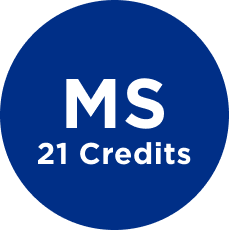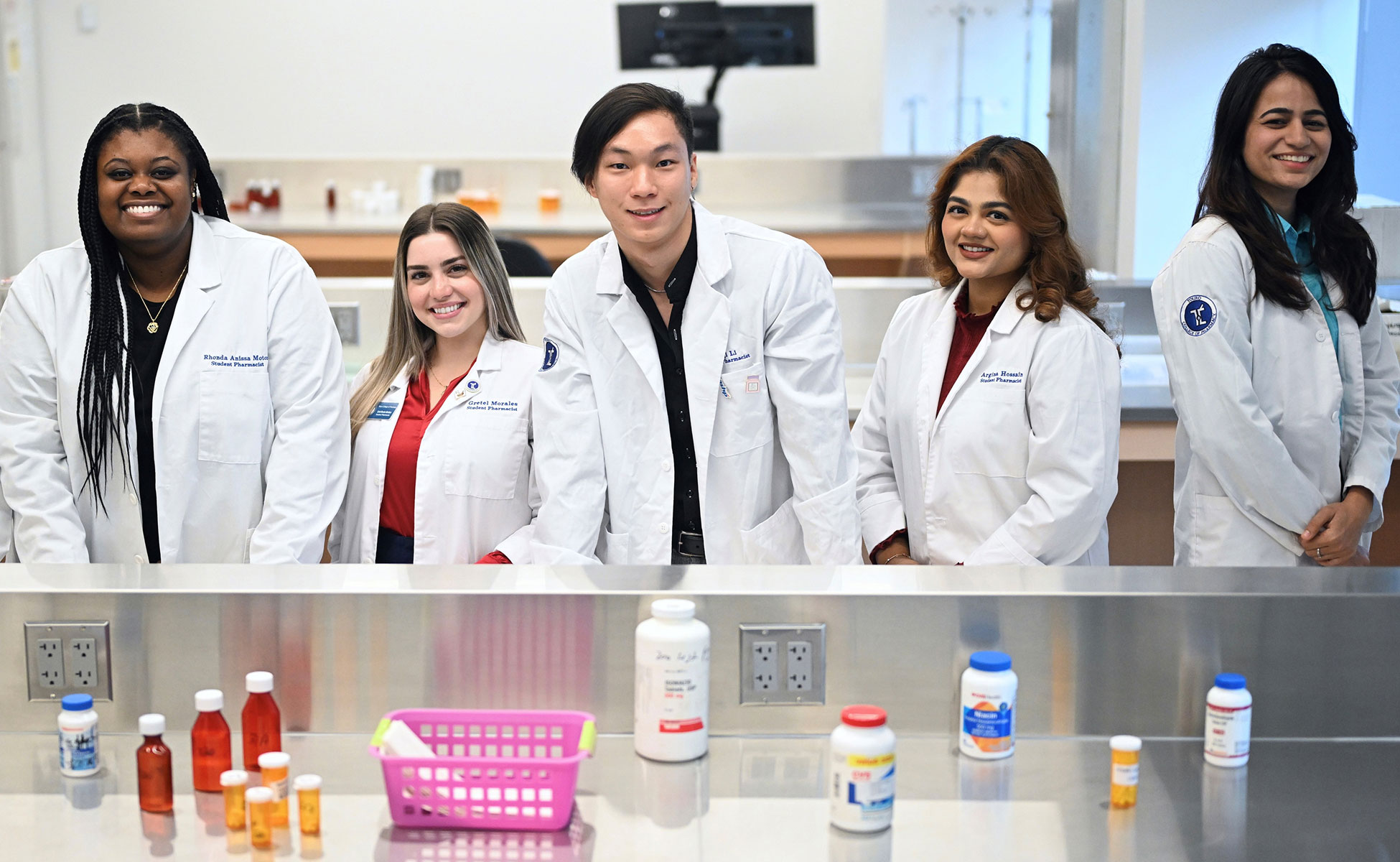Whether you’re interested in earning an MBA, MS, or Advanced Certificate in Healthcare Management, you can bolster your PharmD with business knowledge that gives you the skills to explore finance, management and leadership opportunities in the pharmaceutical industry and beyond.
The joint PharmD / Healthcare Management degree program (MBA, MS, and Advanced Certificate options) is in collaboration with our sister school, Touro's Graduate School of Business. Touro GSB is conveniently located on the same campus as Touro College of Pharmacy, right here at 3 Times Square in Manhattan.
Additional Credits You'll Need Beyond Your PharmD Credits:

An MBA is 42 credits, but 12 credits transfer from your PharmD, so you’ll only need 30 credits at GSB to complete your MBA.

An MS is 33 credits, but 12 credits transfer from your PharmD, so you’ll only need 21 credits at GSB to complete your MS.

The Advanced Certificate is 15 credits, but 6 credits transfer from your PharmD, so you’ll only need 9 credits at GSB to complete your Advanced Certificate.
Management and Leadership in the Pharmaceutical Industry
In today’s changing healthcare landscape, pharmacists often benefit from having additional knowledge beyond clinical skills. Aspiring pharmacists can stand out from the crowd with graduate education in healthcare management. Along with expanding the potential settings you can work in as a pharmacist, a graduate degree in business also allows you to climb the career ladder faster and qualify for management and leadership roles.
With a business degree, you can pursue leadership and marketing roles in the pharmaceutical industry, management positions in government, managed care administration, and more.
In our collaborative degree program, you can choose to earn an MBA, MS, or advanced certificate. Each program has its unique benefits and caters to different career paths.
Three Options: MBA, MS, or Advanced Certificate
Our three degree options allow you to choose the best fit for your specific career goals. While the MBA gives you the broadest knowledge of leadership and business skills, the MS gives you the most additional healthcare knowledge. If you're interested in the field but not sure if you have the time or inclination to complete another graduate degree while enrolled in the PharmD program, the advanced certificate is a good choice. This option lets you explore the field without the intensive focus of an MBA program.
MBA in Healthcare Management
Our MBA program offers a specialized focus in healthcare management that goes beyond the general MBA courses you’ll take; the curriculum is a perfect fit with the PharmD. This program offers you the widest range of business knowledge and positions you to qualify for high-level management and leadership roles in the industry. This degree is a great fit if you’re interested in areas like financial management and business strategy in the healthcare and pharmaceutical space.
A stand-alone MBA would normally be 42 credits and 14 courses. Taken as part of the PharmD/MBA collaborative degree, the MBA is:
Credits: 30 Credits at GSB (12 credits transfer from your PharmD program)
Courses: 10 Courses at GSB (4 courses transfer from your PharmD program)
Program Length:
- Fast track – finish within the PharmD (4 years).
- Regular track – finish in the 3 semesters following your PharmD – summer, fall, spring.
Cost: $975 per credit for 2025-2026 academic year.
For more detailed information on the MBA, visit the Graduate School of Business MBA program page.
Sample Courses Only in the MBA Program
- Information Technology for Effective Management
- Ethics in the Global Marketplace
- Managing for Change
MS in Healthcare Management
The MS program combines healthcare knowledge with business management skills. While you’ll learn plenty of useful managerial and business skills, this degree focuses more on giving you a thorough exploration of every aspect of the healthcare industry. This degree is a great fit if you’re interested in roles on a healthcare management team in the insurance industry, as a practice manager at a hospital, or as a healthcare representative at a pharmaceutical company.
A stand-alone MS would normally be 33 credits and 11 courses. Taken as part of the PharmD/MS collaborative degree, the MS is:
Credits: 21 Credits at GSB (12 credits transfer from your PharmD program)
Courses: 7 Courses at GSB (4 courses transfer from your PharmD program)
Program Length:
- Fast track – finish within the PharmD (4 years).
- Regular track – finish in the 2 semesters following your PharmD – summer, fall.
Cost: $925 per credit for 2025-2026 academic year.
For more detailed information on the MS, visit the Graduate School of Business MS program page.
Sample Courses in Both the MS and MBA Program
- Health Care Management: Trends and Challenges
- Compelling Communication in Healthcare Management
- Healthcare Informatics
Advanced Certificate in Healthcare Management
The advanced certificate option allows you to gain the core knowledge of healthcare management without committing to an additional graduate degree program. This certificate will give you essential knowledge of management, ethics, and informatics in the healthcare space. If you do decide to pursue your business study further, all 15 credits in this program are transferable toward the MBA or MS degree.
A stand-alone advanced certificate would normally be 15 credits and 5 courses. Taken as part of the PharmD collaborative degree, the advanced certificate is:
Credits: 9 Credits at GSB (6 credits transfer from your PharmD program)
Courses: 3 Courses at GSB (2 courses transfer from your PharmD program)
Program Length:
- Fast track – finish within the PharmD (4 years).
- Regular track – finish in the 2 semesters following your PharmD – summer, fall.
Cost: $825 per credit for 2025-2026 academic year.
For more detailed information on the advanced certificate, visit the Graduate School of Business advanced certificate program page.
All Core Courses in the Advanced Certificate Program
- Healthcare Management: Trends, Issues, & Challenges
- Law & Ethics in Healthcare Management
- Healthcare Financial Management
- Strategic Use of Healthcare Informatics
MBA Skills You'll Use Throughout Your Career
The knowledge you acquire through MBA training will be of use throughout your residency training and career, whether you choose to work in healthcare management, a clinical setting, or academia. Here are some of the key skills you'll learn and some examples of how they might be used:
- Leadership skills:
-
- Holding leadership positions in state and national organizations (e.g. NYSCHP, PPA)
- Managing and directing healthcare teams
- Becoming an entrepreneur in the pharmacy or healthcare space
- Data analytics:
-
- Useful for almost any research project, especially working with large amounts of information
- Public speaking and communication skills:
-
- Effectively communicating with healthcare professionals and the community
- Presenting continuing education
- Advanced critical thinking and problem-solving skills:
-
- Deciding pharmacotherapy recommendations in a clinical setting for a challenging patient with limited resources
- Strategic planning:
-
- Useful on a daily basis for goal setting, planning, and allocating resources
- Ability to see each angle when implementing new ideas: the clinical aspect, logistics, cost savings, and feasibility
The Growing Demand for Medical and Health Services Managers
Between 2020 and 2030, employment of medical and health services managers is expected to grow by 32.5%. Around 57,000 healthcare management job openings are projected to be available each year. Hospitals employ the largest number of healthcare managers at 33%, followed by physician offices at 12%.
The aging baby boomer population, retiring administrators and managers, and the growth of medical group practices will all contribute to this increased demand. Widespread use of electronic health records (EHRs) will also increase demand for managers with knowledge of health information technology and informatics. In the PharmD / Health Management collaborative degree program, you’ll learn how to take charge in a constantly evolving medical landscape and manage teams as well as healthcare data.
Healthcare Management Salary
The average healthcare manager makes close to $10k more yearly than the average management professional in other industries. Medical and health services managers working in the government and hospitals were the most well-compensated in the field, making upwards of $100k in median annual wages. In 2024, the highest 10% of healthcare managers earned more than $219,080 annually.
What Do Medical and Health Services Managers Do?
Medical and health services managers work behind the scenes to keep healthcare facilities running efficiently. This can include directing the business and financial aspects of a healthcare institution, managing medical information, or directing healthcare staff. In hospitals and other healthcare settings that are open 24/7, the ability to work evenings and/or weekends can be a requirement.
Potential Responsibilities in a Healthcare Management Role
- Develop goals and objectives for the department
- Plan budgets and monitor spending
- Train, supervise, and provide guidance for staff
- Keep on top of relevant laws and regulations
- Work with IT team to analyze data and improve health outcomes
Although many management professionals in the healthcare industry work in hospitals, nursing homes and group practices, the PharmD / MBA collaborative degree will give you additional career flexibility. The combination of a pharmacy background with business knowledge will allow you to enter into management and marketing roles in the pharmaceutical field, or become an entrepreneur in the industry.
How the PharmD/MBA Program Works
As a PharmD student enrolled in the MS or MBA program in Healthcare Management, you’ll be able to save time on your MS or MBA degrees when completing it jointly with the PharmD. You have the option to complete both degrees within 4 years, or take a little longer. Each school grants its respective degrees upon completion of the respective program. With either option you’ll take a few courses early on in your studies that count towards both your PharmD and business degree, such as “Health Care Systems & Health Policies” during the first year spring semester.
Regular Track Option
The regular collaborative degree track takes about 5 years to complete. After finishing all your PharmD courses, you’ll complete the majority of your credits towards your business degree starting in the summer of your 4th year and continuing through your 5th year.
Fast Track Option
All MBA, MS or Advanced Certificate coursework can be completed within the 4-year PharmD degree, and begin in your first summer between your first and second year as a pharmacy student. If you begin on the Fast Track, and circumstances change or the additional coursework becomes difficult to manage, you can switch to the regular track and finish your healthcare management coursework after completing the PharmD.
Admissions
Once you are admitted to TCOP, let TCOP know your interest in the MBA, MS or Advanced Certificate program after admission or within the first year of the PharmD. You will apply to the business program through TCOP. Decisions for admission will be in the spring of your P1 year.
Contact
Elizabeth J. Unni, PhD, MBA
Founding Director, TCOP/GSB Collaborative Program
Chair of Social, Behavioral and Administrative Sciences and Associate Professor
Touro College of Pharmacy
elizabeth.unni@touro.edu
Elizabeth Loftus, DHSc, MS
Assistant Professor of Health Care Administration and Business Programs Administrator
Graduate School of Business
elizabeth.loftus@touro.edu


